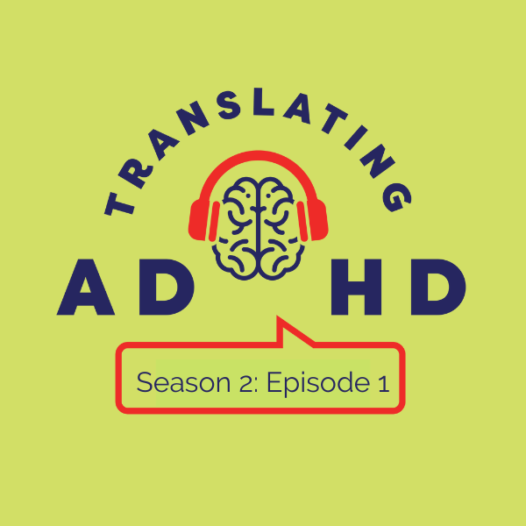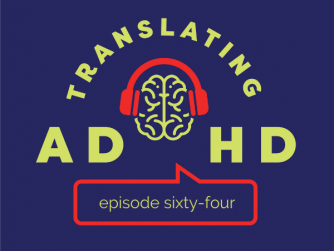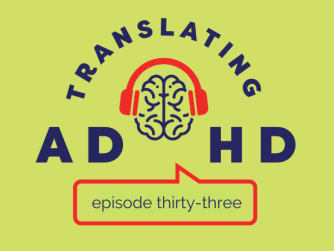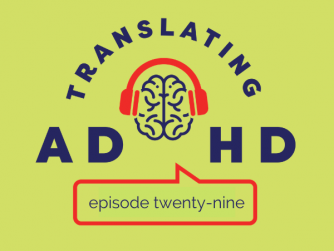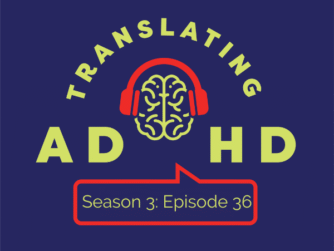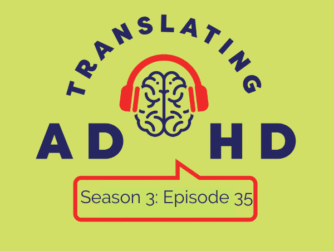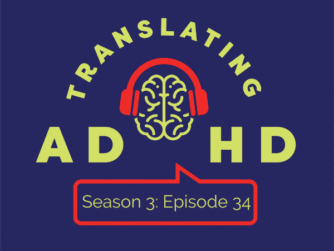Returning from their summer hiatus, hosts Asher Collins and Cameron Gott introduce the new season of Translating ADHD and explain the changes they’ve made to the podcast. They discuss the concept of “seasons” and how they will organize the content around specific topics. Ash and Cam see an opportunity of this Season 2 as a reboot of the podcast – to review and revisit key concepts unique to the podcast. The idea is that new listeners can start fresh with Season 2 and veteran listeners can synthesize concepts already familiar to them.
The hosts also mention their focus on coaching processes and how they intend to provide insights to help listeners navigate the barriers of ADHD. They share upcoming topics and changes to the Discord community for their patrons. The episode sets the stage for the season and hints at the upcoming discussion on “journey thinking” in the next episode.
Episode links + resources:
For more of the Translating ADHD podcast:
- Episode Transcripts: visit TranslatingADHD.com and click on the episode
- Follow us on Twitter: @TranslatingADHD
- Visit the Website: TranslatingADHD.com
Episode Transcript:
Ash: Hi, I’m Ash
Cam: And I’m Cam.
Ash: And this is, wait for it, Translating ADHD Season Two. Woo.
Cam: Woohoo!
Ash: So, Cam, do you want to give our listeners a little context for what we mean by season two?
Cam: I sure will, Ash. So, listeners, if you recall from back in the spring of 2023, we were going to take our regular break, and we also saw it as an opportunity to do a reset. We’d been kicking around this idea of a soft reboot. And as we’d been sitting with this, this idea is really gaining in strength. So this is our soft reboot. We’re putting a line down and saying, okay, that past library of episodes, that is Season One. And it’s just about 180, maybe 181. I’d lost count.
Ash: I have no idea, Cam. It’s 180 and change.
Cam: And over a million downloads since November of 2019. So we know that our message resonates. We know there’s a lot of content out there. We get all these emails of like, Hey, where do we start? And so the idea here with this reboot is that we’re going to restart for you.
Ash: You ready for me to jump in?
Cam: Yeah.
Ash: Okay.
Cam: I remember that.
Ash: Yeah, well, I know, but you usually don’t stop quite so abruptly.
Cam: Oh, no, this is Cam 2.0. You see that there was a Cam reboot too, so listeners we’ll leave this in because we need these cues. And I used to ramble on and on and on. It was like, I think, Asher was surprised by how quickly I pivoted and gave space to him. So take it away, Ash.
Ash: All right, Cam, so listeners, when we started this podcast, we could not have envisioned that we would get this far. We just didn’t know what we didn’t know. We’re really proud of the contents of Season One. But we also recognize that listening to 180 plus episodes that have all been built on one another without a clear way to break them up into smaller chunks is really daunting for new listeners.
So moving forward, we’re going to divide our content by seasons around a topic. And we’re keeping that pretty flexible. We don’t know if that means that each year will be a season moving forward and we’ll continue to take our summer break, or if we might get into some topics that demand a shorter season that there’s not 40 plus episodes for.
We’ll keep you posted as we go, but the idea here is that you can jump into any season and a smaller subset of episodes, and those episodes are self contained. They will make sense even if you haven’t listened to the back catalog of Season One. So that’s the reason we’re making this change. And you all will see that change in your podcast feeds because you’ll see the season markers show up in whatever way they do, depending upon how you listen. With this episode marking the first episode of Season Two.
So, Cam, should we pivot and talk about what this season’s topic is going to be? I’m really excited about this.
Cam: Yeah. So we settled on a topic that we came to early in the back catalog. And that is that universal question, right, Why do I not do what I know I ought to do? That is that universal question that we ask ourselves with ADHD. So this is the theme. And that was a lot of, again, what resonated through those 180 episodes.
And that’s what we’re doing here, is we’re going to do this season right here is to really look back and pull forward the salient pieces and lay it out in a more concise fashion. The other thing is that back catalog is still there. You can always go back and listen to us. That’s available, and you’re welcome to do that. As people tend to do, they go back, they listen to an episode for a second, even a third time and glean more information.
So let’s jump in and really talk about the other things that we’ve talked about, Ash, and that is something that it’s had my attention bringing more of a reveal to the coaching process. So Ash and I have been talking, and we realized that those three barriers of ADHD, right – the barrier to awareness, the barrier to action, and the barrier to learning and pulling the learning forward – they actually line up with what we call a coaching process. So the coaching process is this discovery, action, insight, or awareness, action, learning actually lines up.
So those of you who are out there, maybe you’ve tried coaching and it didn’t work or didn’t take. This is one of the reasons why, because the actual phases or stages of the coaching process line up with the barriers of ADHD. So Ash and I were thinking that if we share more about these stages and the opportunities to explore each of those and to give you some your term inside baseball, right, or to reveal kind of the process that’s at play there, the coaching process, it can give you ways to move through those barriers.
Ash: Exactly, Cam. Our goal with this podcast has always been for it to be a standalone resource. We’re not here to sell you coaching. We’re here to give you good information. And if this show is enough of a framework to do that good work, excellent. That is exactly what it’s here for. So we’re hoping by giving you some inside information as to how we think as coaches and what we know about what works for our clients, that will only help you be able to use this show as a pocket ADHD coach.
The other thing that I think is really important to mention, and this is not a knock on coaches that exist outside of the ADHD space. If you were to draw ADHD coaching as a Venn diagram, it’s really just a circle because it’s equally about knowing how to coach to the ADHD as it is knowing how to coach the naturally creative, resourceful and whole person.
So in my experience with my clients when they’ve attempted coaching before and haven’t been so satisfied with the results, it was with a coach who maybe didn’t know how to navigate the ADHD and how those barriers can throw wrenches into the coaching process itself. So listeners, not only will this season help you better use this show as a framework, will also make you a more educated consumer.
If you are looking for coaching or other support, our hope is that you better understand how we account for the ADHD of it all as we’re working with our clients. Because the ADHD is always in the room, even if the coaching topic has very little to do with ADHD, which it often does, because while we both are specialists in terms of what clients we work with based on what has their attention and where they are in their journey, we both practice whole person coaching, so we can end up coaching about any number of things that might not have a lot to do with ADHD, you know. But ADHD is still there having an impact both inside the coaching sessions and around whatever the dilemma is that we’re coaching on.
Cam: That’s great. Ash. And just to add to that is that our own lived experience bringing in and how we’ve highlighted that in the last years, around cultural diversity and additional neurodiversity or your unique neuro flavor, right? Do you have depression in the room? Do you have anxiety in the room? Do you have other things going on that are going to influence your own ADHD experience and how you navigate this universal question?
So yeah, there’s that piece. I’ll also add to is, as a coach trainer and a mentor, I listened to a lot of coaching individuals, and there’s something else in place. So as you said, there’s some who don’t really take it into consideration the actual ADHD. There are coaches who are well versed with ADHD and often will go in that direction in the sense of educating and really, you know, sharing about the executive function challenges and not really lean heavily into the coaching process.
And so a couple of things. One is, I noticed that coaching is not very effective when the client is not able to be a good partner in that process. And so who’s that up to? That is up to the coach to inform and teach the client how to be a better partner. So when we share with our clients, again, the actual process, sort of like how to be successful in this relationship, it can be very helpful.
And as you said, we’re not here to train you as coaches. We’re here, and we see a real opportunity to give you some insight in how you show up more as a partner. The fascinating thing is that, as you said, we’re also not trying to sell you on hiring a coach. It is showing up, whether it’s an equal partner, whether it’s with your coach, whether it’s with your therapist, whether it’s with your pharmacologist, whether it’s with your spouse, whether it’s with a colleague and not show up in that one down.
So that’s the other thing that’s in play here, is what are some of the dances, so that whoever you’re dancing with, whether it’s your coach or someone else, you’ve got a sense of these moves around these different barriers and these different phases to move forward on whatever you’re trying to move forward on.
Ash: Cam, I love that you bring up some other ways that our clients might have done work before, during, or after their time with us in coaching. I was just talking to a new client about my role as a coach. They were asking about sort of the duration of coaching. How long are we going to work together? What does the end point look like? And I can tell you right now, here’s what the end point does not look like. It does not look like my client has realized their entire big agenda thanks to our coaching work. That’s almost never the place I stop with a client. It’s usually quite a bit before that.
And there’s a couple of reasons for that. Number one, coaching work is not the only way to do good work. Cam, I don’t know if I mentioned this at all last season, but I inexplicably took up kick boxing last February, and that has been a great way for me to do some work, much like the work that you and I do. The gym that I attend focuses on positive accountability, focuses on being where you are on your own journey, not comparing to others, not competing with others, but lifting others up. And it’s been a surprisingly amazing experience in terms of doing some of my own work.
And most of the time, when a client comes through my door, they have other ways that they’ve done their own work, that they’ve developed more awareness about themselves. So coaching is one of many ways to do this work. And it’s rarely, if ever, a one stop shop.
And two, the reason I’m not coaching a client all the way through realization of their big agenda is because number one, it’s not a destination, it’s a journey and that’s where we’re going to start. So if you’re new to this podcast, and you don’t know what that means, revisiting journey thinking is where we’re going to go next week. So stay tuned.
And number two, the active engaging in this coaching process teaches our clients to think differently. Thinking about how they think and they get better at it over time. So coaching session number three, right? Every dilemma that the client is encountering is a coaching topic that we’re working through, and we’re cultivating awareness, and we’re engaging in this practice of learning something new and designing some action around what we’ve learned.
Three or six months down the road, that client is starting to come to coaching sessions telling me about dilemmas that they’ve had that they’ve engaged in that same process that we would in a coaching session, coupled with what they’ve learned about themselves in coaching to pause, disrupt and pivot all on their own.
And so the work doesn’t stop. When our clients stop paying us and man, I love nothing more than hearing from a client I haven’t heard from in a while, and hearing how the work is continuing and what has their attention now, right? I tell clients all the time, you could do this work without me. I couldn’t do it without you. I’m just a facilitator. You’re in the driver’s seat. I know how to help you get curious, and I can teach you over time how to do that for yourself, but you have to show up and be a willing partner. You have to keep engaging, and that’s the part I can’t do for you. I can show you how, I can help you engage, I can help you get better at it, but the work doesn’t happen without full partnership from the client.
Cam: I’ve got a very busy schedule right now putting some stuff out. And one was a talk, and the title is “Your Ever Evolving Relationship With Your ADHD”, right? And you’re talking about how people are different, and we can’t predict what the outcome of the coaching will be, but we know it’ll be different. There will be learning. There will be growth. And, you know, for next week, this idea of journey thinking and detaching from outcome is a really brilliant place to begin our journey as we delve in and dive into our Season One here.
Ash: Season Two?
Cam: Keep it in, man. keep it in, cause you know, we’re just real and authentic, and we’re just easing back in. We got nothing to hide, people, nothing to hide.
Ash: 182 episodes by the way, I looked it up.
Cam: Okay, thank you.
Ash: That’s Season One. So yeah, as we start with Season Two, we’re going to start with this premise of journey thinking, which is at the foundation of all that we do.
So, Cam, in our last few minutes, I have something else I want to share with our listeners. Do you have anything you want to share with our listeners?
Cam: I do. Then you go. Okay, I’ll go. There are people out there and they’re just like waiting. They’re waiting for this, Ash. What about Mount Rainier? I just know it. I’m sure of it, that they’re out there just like baited breath.
Ash: And if you’re a new listener, and you haven’t yet listened to our back catalog of Season One or don’t intend to, just ride along for the next few minutes. And it’s okay if you have no clue what we’re talking about here.
Cam: That’s a good setup. That’s a great setup. So yeah, we’ve been giving that some thought, and actually I’ve been doing a little bracketology, right? Sort of that final four, where we start with like 64 teams or 64 ideas to move past Mount Rainier and Lunch Counter. It’s come down to two, Ash. They’re two finalists. Do you want to hear what they are?
Ash: Of course I do.
Cam: Okay. Ready for this?
Ash: I’m ready.
Cam: Fish ladder and guy in a cubicle. What do you think listeners?
Ash: So, listeners, this is genuinely the first time I’ve heard this. That was a genuine reaction. I have no idea where Cam is going to go with either of those concepts. And Cam, I don’t want you to tell me. I want to be surprised. Let’s address them when they come up
Cam: No, no. no. A little backstory here briefly, and then we’ll pass it off to you. So, that was a joke, right? It’s not guy in a cubicle. It’s not a fish ladder. The idea here with Mount Rainier and this whole universal question of Why do I not do what I know I ought to do? I think one of the themes that will be present here that will continue on is this whole idea of it’s difficult for us to get to causation.
You’ll hear us in back episodes talk about living at effect or down in the valley. So we’re going to bring all that forward and just sort of like, you know, with lunch counter in Mount Rainier, I’m just going to say, you know, with Obamacare, right. Obamacare is like, if you like the lunch counter, you can keep the lunch counter. Right. Sorry. I just had to do my Obamacare. If you like Mount Rainier, you can keep it. What we are going to do is we’re not going to do that big, colorful metaphor. We are working on it, you know. We’re thinking of something that’s a little bit more, you know, a carry on, right? A carry on version of Mount Rainier because it is a bit cumbersome and heavy, but this idea of getting to causation and that if you’re here and you’re listening, you’re like, ah, these barriers are driving me crazy.
Back to what Ash said, be where you are, sit with it where you are, as long as it’s safe, right? Safety first, but be where you are if you’re, again, stuck at awareness or stuck at inaction or not able to pull learning forward, be where you are in this process and sit with it. Bring that keen observer and notice awareness. More observing than judging. These are some coaching pieces that you can do as your own partner. Just, again, have that observation. And we’ll kind of look at this whole idea of getting to causation through Season Two.
Ash: Yeah, I’m still just sitting here amused. I really thought the fish ladder and the guy in the cubicle were real. it certainly sounds like something you would come up with. Uh, I was a little stoked to…
Cam: Gott in a cubicle. Awesome.
Ash: So, here’s what I wanted to share. For those of you that are patrons and haven’t been in Discord in a while or never signed up for Discord, or for those of you who were a little frustrated by Discord in the past or maybe just never quite checked it out, we’ve simplified our Discord server quite a bit.
And another thing we’re looking at doing with this new season is doing more community events. So there will be an opportunity each month to have face time with Cam or with me or both. And that is a commitment that we are making to you. It’s something that we tried very early on, when our community was much smaller, and it didn’t quite take then, but we’re seeing a renewed interest in that now.
And not just that, Cam and I are also making a commitment to our patrons who are spending time in Discord, that you’ll see our faces around Discord more often, engaging and chatting with you where we can. But you know the value is not just in Cam and I here. We’re talking about this coaching process. When we say at the end of an episode that our listeners are working together to do their own understand, own, and translate work, we mean it. It’s the coolest thing to see that happening in the Discord.
So if you were previously intimidated, we’ve really brought it down to basics, and we really want to keep it centered on a space where you can get curious about your own ADHD and get support from other people doing the same thing who speak the language of this show. And we know how powerful that is because we see it happen in Discord all the time, and we see it in our group coaching courses. So, if you haven’t previously been a patron and this is something that you’re interested in trying, visit the website translatingadhd.com and click on the Patreon tab. For five bucks a month you sign up, and then you should be able to link your Discord account to your Patreon account, which will put you right into our Discord server.
All right, Cam, anything else? Have we covered what we needed to cover for kicking off Season Two?
Cam: I think we have. And just getting back in the chair with you is, it’s good. I’m excited about this.
Ash: I am, too. Me too, Cam. I’m really excited about this. Just minor tweaks, right? We don’t have to reinvent the wheel with the show or with Discord. We’re just making some small adjustments based on what we’ve learned and what our listeners have been asking for.
And as always, we pay attention to your feedback. So if you’re in the Discord server and want to leave it there, if you leave a review, if you shoot us an email, we do pay attention to that feedback, and we look for those common themes. Big reason we’re making this change and going to a seasonal format is because of the feedback from newer listeners that it’s intimidating to tackle that many episodes, and it’s hard to follow our Season One.
If you don’t listen from the beginning because we’re using language that is explained in previous episodes without explaining it again, we’ll still be doing some of that because we don’t want to be so exhaustive about re-explaining concepts, but we’re going to try it in this more contained format where every episode in this season is something you should be able to follow, even if you never listen to the back catalog.
Cam: All right. So let’s wrap.
Ash: Yeah, let’s wrap. And then next week we’ll dive in with journey thinking, which is at the foundation of what we both do as coaches. I think it’s the core principle of my coaching practice and I’m stoked. So until next week, I’m Ash.
Cam: And I’m Cam.
Ash: And this was the Translating ADHD podcast. Thanks for listening.

